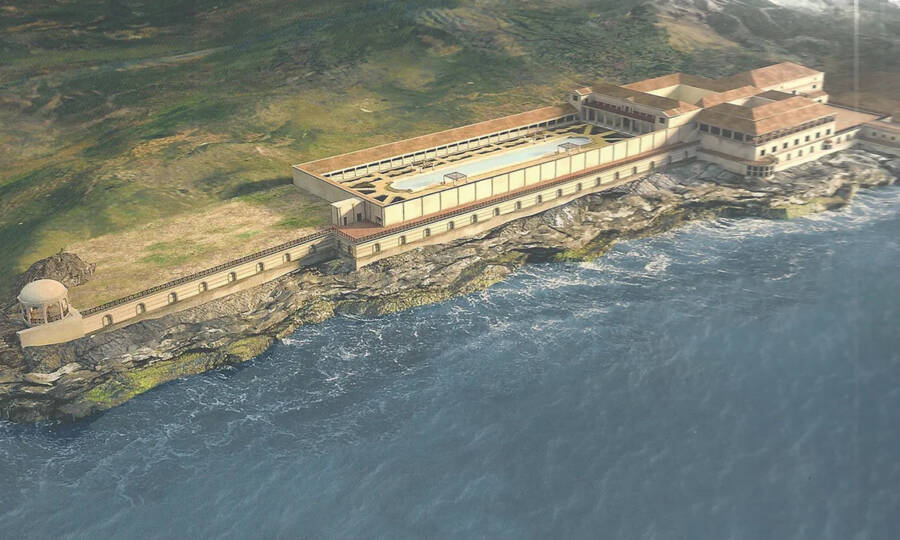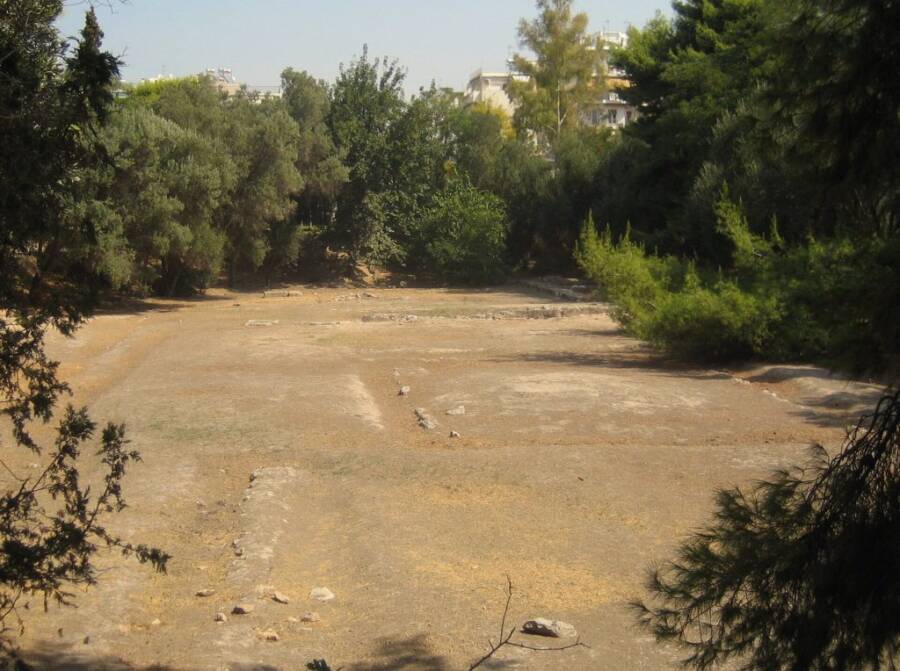Newly transcribed ancient texts reveal that Plato was likely buried under a garden at Plato's Academy in Athens, Greece.

Nevena Tsvetanova / Alamy Stock PhotoMarble statue of the ancient Greek philosopher Plato in Athens, Greece.
Italian researchers from the University of Pisa say that they may have identified the burial site of ancient Greek philosopher Plato, potentially ending a centuries-old mystery.
Using advanced technology to analyze texts from the ancient library at Villa of the Papyri, researchers have uncovered previously unknown information about Plato’s life and burial in the city of Athens.
Now, researchers plan to continue their study to uncover more secrets from the ancient world.
Uncovering Clues Beneath Volcanic Ash

Getty MuseumAn artistic rendition of what the villa looked like before its destruction during the 79 C.E. eruption of Mount Vesuvius.
The current research on the papyri first began three years ago with Graziano Ranocchia, a papyrologist at the University of Pisa. Ranocchia is a member of the GreekSchools research project conducted with the National Research Council at the National Library in Naples, two organizations dedicated to expanding classical historical research using advanced technology.
“The aim of the project is to arrive at a new, more reliable and comprehensive edition of the work, exemplifying the most advanced methods in papyrology and textual criticism via the application of new and highly sophisticated investigation techniques,” Ranocchia’s personal statement reads.
The ancient papyri were first discovered in the 18th century among the ruins of Villa of the Papyri. The villa, which is believed to have belonged to Julius Caesar’s father-in-law, was home to a large-scale library when Mount Vesuvius buried it in ash in 79 C.E. Today, researchers have recovered more than 1,800 papyri texts from the villa.
By 1991, researchers had transcribed pieces of the villa’s papyri texts, but their delicate nature made it difficult to fully unveil their contents. To remedy this, Ranocchia and his team used AI technology to decipher and reinterpret 1,000 more words in the text, marking a 30 percent increase from the previous analysis.
The newly translated texts detailed ancient Greek philosopher Plato’s final resting place, which for centuries has remained a mystery.
The Life And Tomb Of Plato Revealed

Tomisti/CC BY-SA 3.0The ruins of Plato’s Academy in Athens, Greece.
Until now, historians only knew that Plato was buried in the vicinity of his Academy in Athens. According to the papyri texts, Plato was laid to rest in a private garden near a sacred shrine to the Muses.
This academy operated northwest of the city walls of Athens from 387 B.C.E. to the 6th century C.E. and was home to several intellectuals, including Aristotle and Heraclides. It was destroyed by the Roman dictator Sulla in 86 B.C.E.
In addition to detailing Plato’s resting place, the papyri contained interesting information about the Greek philosopher’s life.
According to old accounts, Plato was sold into slavery in 387 B.C.E. while in Sicily. According to the information on the papyri, however, this incident occurred either in 399 B.C.E. or in 404 B.C.E. during the Spartan conquest of Aegina.
Discrepancies regarding how Plato died are also of interest to the researchers. According to Cicero, an influential Roman philosopher and politician, Plato died while writing. But according to Hermippus, a 5th-century B.C.E. Greek writer, Plato died while attending a wedding at the age of 81.
Researchers hope that further research into the Herculaneum papyri will address the conflicting accounts and provide more reliable information about one of history’s most influential figures.
For now, researchers expect to be finished with this project by 2026.
After reading about the possible discovery of Plato’s tomb, dive into the story of his mentor, Socrates, and how he died by poisoning. Then, read about the mystery surrounding the lost city of Atlantis, which was first mentioned by Plato himself.






